2018 Asian Games Success: Policies for the Development of Indonesian Elite Athletes
Abstract
The success of elite sports in Indonesia plays an important role in building and constructing national identity. Along its development, the success of sport is pictured as symbol of national resurrection and sport winner as national icon. Status and power of sports Indonesia among other countries is measured by the country’s success of having achievement in international sport events. Elit sport development are implemented through sport introduction stage, monitoring, fostering, also developing talent and improving achievement (UU SKN No. 3 Tahun 2005). The system of elite sport development in Indonesia which is oriented to: a) build elite’s facility; b) support for athletes; c) provide training and sport science; and d) centered competition opportunity (Pelatnas) in the preparation of international competition. This study explores the sports achievements of Indonesia with the aims of maximizing the policy of elite sport development in Indonesia. The achievements of elite sports are the pride of the country, including obtaining diplomatic recognition, ideological competition and a belief that the success of sports in international level gives benefit for socio-politic in the nation, starting from feeling pleased, optimistic and giving impact economically, especially in relation to organizing elite sports competitions.
Keyword: achievement, elite athlete, Indonesia, national identity, sport development
Full Text:
PDFReferences
Brown, D. J., Arnold, R., Reid, T., Roberts, G., Brown, D. J., Arnold, R., … Reid, T. (2018). A Qualitative Exploration of Thriving in Elite Sport, 3200. https://doi.org/10.1080/10413200.2017.1354339
De Bosscher, V., De Knop, P., van Bottenburg, M., Shibli, S., & Bingham, J. (2009). Explaining international sporting success: An international comparison of elite sport systems and policies in six countries. Sport Management Review, 12(3), 113–136. https://doi.org/10.1016/j.smr.2009.01.001
de Bosscher, V., Shilbury, D., Theeboom, M., van Hoecke, J., & de Knop, P. (2011). Effectiveness of national elite sport policies: A multidimensional approach applied to the case of Flanders. European Sport Management Quarterly, 11(2), 115–141. https://doi.org/10.1080/16184742.2011.559133
Funahashi, H., Bosscher, V. De, & Mano, Y. (2015).
Understanding public acceptance of elite sport policy in Japan : a structural equation modelling approach, 4742(November). https://doi.org/10.1080/16184742.2015.1056200
Gulbin, J. P., Croser, M. J., Morley, E. J., & Weissensteiner, J. (2013). An integrated framework for the optimisation of sport and athlete development : A practitioner approach An integrated framework for the optimisation of sport and athlete, (August), 37–41. https://doi.org/10.1080/02640414.2013.781661
Hu, X. (Richard), & Henry, I. (2017). Reform and maintenance of Juguo Tizhi: governmental management discourse of Chinese elite sport. European Sport Management Quarterly, 17(4), 531–553. https://doi.org/10.1080/16184742.2017.1304433
Hong, F., Wu, P. and Xiong, H. (2005) Beijing ambitions: An analysis of the Chinese elite sports system and its Olympic strategy for the 2008 Olympic games, The International Journal of the History of Sport, 22(4), 510-529.
Instruksi Presiden Nomor. 3 Tahun 2018 tentang Percepatan Pembangunan /Rehabilitasi Prasarana dan Sarana Asian Games 2018.
Kay, J. (2013). Maintaining the traditions of british sport? the private sports club in the twentieth century. International Journal of the History of Sport, 30(14), 1655–1669. https://doi.org/10.1080/09523367.2013.831839
Kidd, B. (2008). A new social movement : Sport for development and peace, 0437. https://doi.org/10.1080/17430430802019268
Lestari, R., Rahadian, A., Amrulloh, A., & Taufik, M. S. (2020). The Relationship Of Mental Thoughness And Competitive Anxiety With Karate Referee Performance. Jp. jok (Jurnal Pendidikan Jasmani, Olahraga dan Kesehatan), 4(1), 98-108.
Liston, K., Gregg, R., & Lowther, J. (2013). Elite sports policy and coaching at the coalface. International Journal of Sport Policy, 5(3), 341–362. https://doi.org/10.1080/19406940.2012.735689
Ma’mun, A. (2019). Governmental Roles in Indonesian Sport Policy: From Past to Present. International Journal of the History of Sport, 36(4–5), 388–406. https://doi.org/10.1080/09523367.2019.1618837
Ma, Y., & Kurscheidt, M. (2019). The National Games of China as a governance instrument in Chinese elite sport: an institutional and agency analysis. International Journal of Sport Policy and Politics, 11(4), 679–699. https://doi.org/10.1080/19406940.2019.1633383
Molan, C., Kelly, S., Arnold, R., & Matthews, J. (2019). Performance Management: A Systematic Review of Processes in Elite Sport and Other Performance Domains. Journal of Applied Sport Psychology, 31(1), 87–104. https://doi.org/10.1080/10413200.2018.1440659
Park, J. W., & Lim, S. (2015). A chronological review of the development of elite sport policy in South Korea. Asia Pacific Journal of Sport and Social Science, 4(3), 198–210. https://doi.org/10.1080/21640599.2015.1127941
Rahadian, A. (2014). PENGARUH OUTDOOR EDUCATION TERHADAP TINGKAT SELF CONFIDENCE (Doctoral dissertation, Universitas Pendidikan Indonesia).
Rahadian, A. (2018). Aplikasi Analisis Biomekanika Untuk Mengembangkan Kemampuan Lari Jarak Pendek (100 M) Mahasiswa Pjkr Unsur (Kinovea Software. Jurnal Maenpo, 8(1), 1-13.
Rahadian, A., & Suryakancana, U. (2018). Kebijakan Olahraga Dalam Pemerintahan Lokal: Sebuah Penelitian dalam Merumuskan Rancangan Induk Pembangunan Olahraga Nasional
Rahadian, A., & Taufik, M. S. (2021). Spirit Olympism Dalam Pendidikan Jasmani Dan Olahraga. Penerbit Adab.
Rycke, J. De, & Bosscher, V. De. (2019). Mapping the potential societal impacts triggered by elite sport : a conceptual framework, 6940. https://doi.org/10.1080/19406940.2019.1581649
Sotiriadou, P. (2013). Sport development planning: The Sunny Golf Club. Sport Management Review, 16(4), 514–523. https://doi.org/10.1016/j.smr.2012.09.002
Sotiriadou, P., & De Bosscher, V. (2018). Managing high-performance sport: introduction to past, present and future considerations. European Sport Management Quarterly, 18(1), 1–7. https://doi.org/10.1080/16184742.2017.1400225
Peraturan Presiden Nomor. 48 Tahun 2017 tentang Penyelengaraan Asian Games 2018
Peraturan Presiden Nomor 95 Tahun 2017 tentang Peningkatan Prestasi Olahraga Nasional (PPON).
Uchiumi, K. (2010). On Sporting Nationalism. Hitotsubashi Journalof Arts and Sciences, 51, 1–17.
Undang-Undang Republik Indonesia Nomor 3 Tahun 2005 tentang Sistem Keolahragaan Nasional (SKN)
Veal, A. J. (2011). Planning for leisure, sport, tourism and the arts: Goals and rationales. World Leisure Journal, 53(2), 119–148. https://doi.org/10.1080/04419057.2011.580553
Wang, Y. H., Hu, C., Hurst, C. S., & Yang, C. C. (2014).
Antecedents and outcomes of career plateaus: The roles of mentoring others and proactive personality. Journal of Vocational Behavior, 85(3), 319–328. https://doi.org/10.1016/j.jvb.2014.08.003
DOI: https://doi.org/10.35194/jm.v11i1.1278
Refbacks
- There are currently no refbacks.
Copyright (c) 2021 Jurnal Maenpo : Jurnal Pendidikan Jasmani Kesehatan dan Rekreasi
License URL: https://creativecommons.org/licenses/by-sa/4.0/




1.png)

.png)


.png)





(1)_.png)
_.png)









